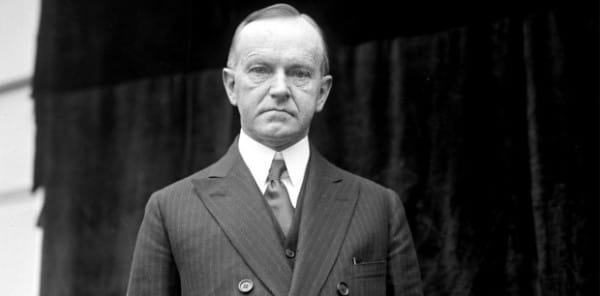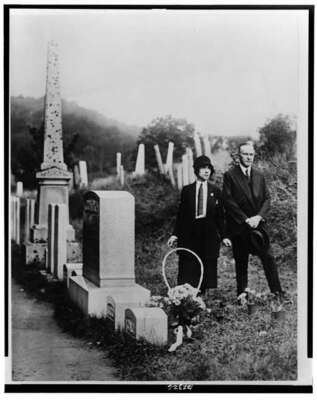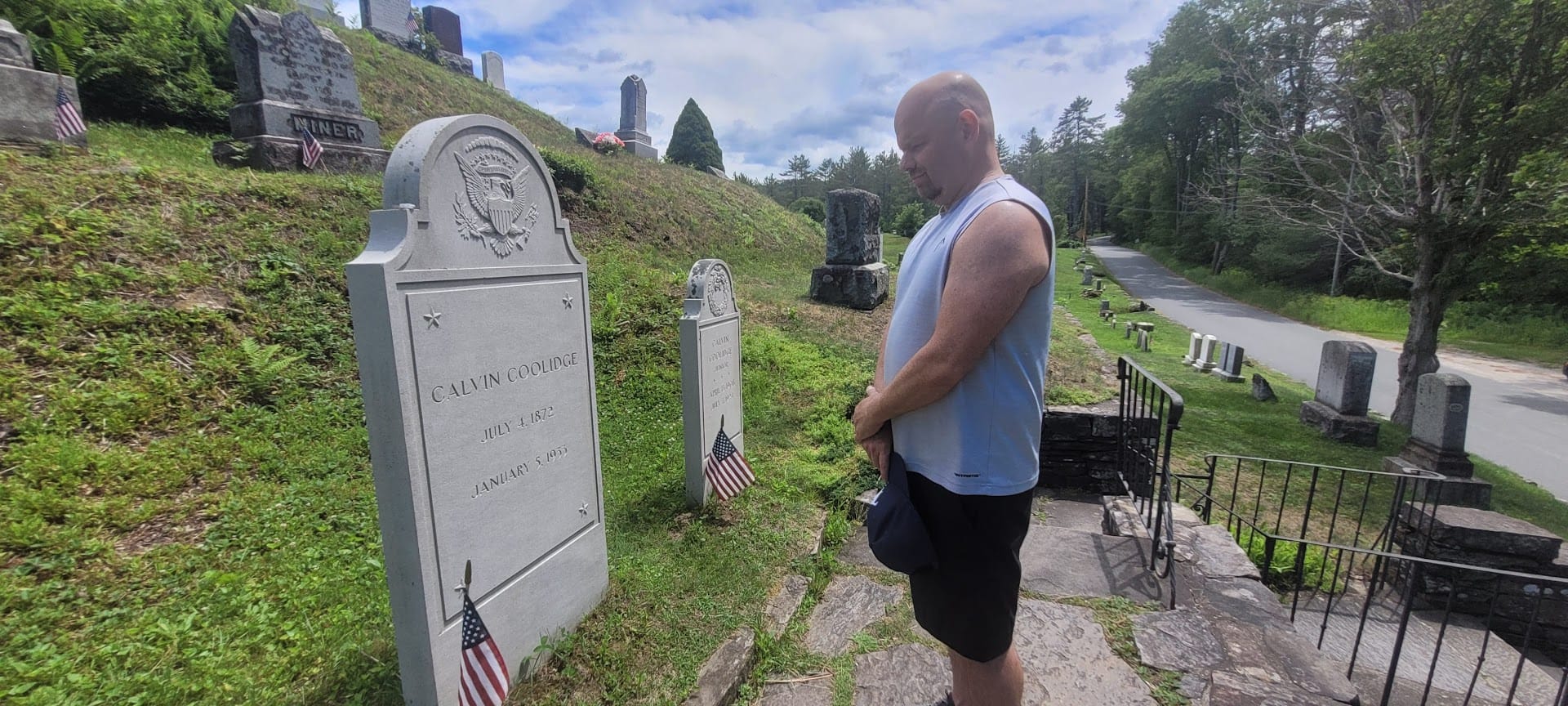No One Is Immune to Grief — Not Even Presidents
This article explores the seldom-told story of Coolidge’s silent struggle, offering insight into the human side of the man who led America during the Roaring Twenties. It’s a powerful reminder that even the most powerful figures are not immune to the universal pain of loss.

As we celebrate the fourth of July today, here is some trivia.
There have been three presidents that have died on the 4th of July.
The second and third presidents of the United States, John Adams and Thomas Jefferson, remarkably, died on the same day–July 4, 1826.
James Monroe, our fifth president, died on the 4th of July, in 1831.
So three out of our first five presidents died on the 4th of July. That blows my mind. But that is not the trivia question.
Do you know who the only president to be born on the 4th of July is?
That president would be Calvin Coolidge, the 30th President of the United States. He was born on this day in 1872.
I just got back from a few days in "the prettiest small town in America"–Woodstock, Vermont. As I got closer to Woodstock, I kept seeing signs for the Calvin Coolidge National Historic Site.
Now I consider myself a history buff, but I could not have told you much about Coolidge prior to this trip. To be honest, I couldn't even have been certain what years he was president.
As soon as I got to our lovely B&B in Woodstock, I went on YouTube and did research. Yeah, that's how I like to vacation! I am forever grateful for the patience of my life partner, Erin, but once I stick my head in a rabbit hole, I gotta go down it.
I was not aware of the odd manner in which Calvin Coolidge became president. Coolidge was vice president when President Warren Harding died of a heart attack on August 2, 1923.
Coolidge was on vacation at the time at his family home--the same home that was about fifteen minutes from where I was staying in Woodstock.
Coolidge's home in Plymouth Notch, Vermont, however, was not yet equipped with electricity or phone service back in 1923. A messenger had to be dispatched to drive to the Coolidge home in the middle of the night to deliver the news in person.
Coolidge's father, John Sr., greeted the messenger at the door. He took the telegram upstairs to his son's bedroom where he was sleeping. Coolidge woke up and read the telegram informing him that he was now President of the United States.
The new president said a prayer by his bedside, got dressed, and went downstairs. At approximately 2:47 a.m., Coolidge’s father, who was a justice of the peace, administered the presidential oath by the light of a kerosene lamp in the family’s first floor parlor.
The new president then went upstairs and back to bed.

The moment perfectly epitomized Calvin Coolidge. He was very unassuming, stoic, calm, and, dare I say, "cool."
He would go on to become known as "Silent Cal." He was a man of few words. He believed the less you talk, the more significant your words are when you do talk.
One of the most famous stories about him involves a social function he attended as president. A woman seated next to him once said, “A friend of mine bet I couldn’t get you to say more than two words.”
Coolidge simply turned to her and replied, “You lose.”

While watching and reading about Coolidge, something caught my attention that got me thinking about writing this article.
Less than a year into his presidency, during the summer of 1924, Coolidge's youngest son, Calvin Jr., was playing tennis on the White House courts with his older brother, John.
Calvin Jr. was playing with sneakers and no socks. He developed a blister on his foot.
The blister soon became infected. Despite the best medical attention the country had to offer, the 16-year-old's condition deteriorated, quickly. Bacteria had entered his bloodstream leading to sepsis (also known as blood poisoning).
In the 1920s, antibiotics like penicillin did not exist. Treatment options for severe infections were very limited–basically keep the wound clean and hope for the best.
Amputation could have been an option, but the boy's infection had progressed too much for that to even be an option.
On July 7, 1924, President Coolidge was told there was nothing more that could be done to save his son's life. The president reportedly held Calvin Jr. in his arms and wept uncontrollably until the moment he died.
He kept saying over and over again that someday soon they would all be reunited. He was referencing his own mother who died when the future president was only 12 years old.
Coolidge's father was frequently away from home so the lad grew very attached to his mother. Her death devastated him. Until the day he died, Coolidge carried a locket with his mother's picture in it.
Only five years after his mother's death, Coolidge's younger sister, Abigail, died at the age of 15.
Now, as he held his dying son in his arms, the President of the United States was looking forward to the day they would all be reunited.

Prior to his son's death, Coolidge immersed himself in his work. He was known as a diligent, hard worker.
He methodically worked his way up the political ladder.
In 1898, he began his career as a City Councilman in the small town of Northampton, Massachusetts. He then became a State Representative (1907-1909), Mayor of Northampton (1910-1912), State Senator (1912-1915), Lieutenant Governor (1916-1919), Governor of Massachusetts (1919-1921), before being chosen by the corrupt Warren Harding to serve as his Vice President (1921-1923).
Despite his unassuming nature, Coolidge was ambitious. He came from a long lineage of politicians. It was only natural that he aspired to outdo all his predecessors and become President of the United States.
But things changed during that summer of 1924. He wrote in his autobiography about his son's death, "When he died, the power and glory of the Presidency went with him."
Coolidge also told his wife, Grace, that "the brightness and happiness have gone out of my life."
Grace later said she believed that their son's death "changed him forever."
Their eldest son, John, wrote that his father "never quite got over the loss" and that his demeanor became more withdrawn and somber after Calvin Jr.'s death.
After his son's death, Coolidge began sleeping up to 15 hours per day, often taking four hour naps in the afternoon.
His public appearances became fewer and more subdued. He seemed unfocused, lethargic, and more introspective.
Coolidge even became uncharacteristically short tempered and irritable. His staff became afraid of his outbursts.
Coolidge turned his rage on his wife--on at least one occasion suspecting her of having an affair with an unmarried Secret Service agent named James Haley. When his wife and Haley returned hours late from "a hike" during a trip to Montana in 1927, an angry Coolidge quickly fired Haley.
Biographer Robert E. Gilbert, a psychiatric expert, analyzed Calvin Coolidge’s behavior following the death of his son and concluded that Coolidge met all ten criteria for major depressive disorder.
Biographer Robert E. Gilbert's lecture discussing Calvin Coolidge's battle with depression and grief.
These symptoms included persistent sadness, loss of interest in activities, significant changes in appetite and sleep patterns—including those reports that Coolidge sometimes slept up to 15 hours a day— fatigue, feelings of worthlessness, guilt feelings, difficulty concentrating, and recurrent thoughts related to death.
Although Coolidge maintained the formal duties of being president, his close family and aides observed a noticeable withdrawal, emotional emptiness, and lack of motivation that demonstrated the depths of his depression.
He even expressed his guilt feelings that if he had never been president, his son never would have been playing on the White House lawn and, therefore, never would have died.
He also said that he never felt as powerless as when his son would cry to him, "Please, dad, help me!" And here he was--the most powerful man in the world–and there was nothing he could do to help his own son.
Historians are pretty consistent in their rankings of Coolidge as an average to slightly below average president. They don't understand the personal emotional distress he was battling behind the scenes. Maybe history doesn't care.
Coolidge was a firm believer in small government, especially at the federal level. Many joke that Coolidge took that philosophy to the extreme.
Fairly or not, he became known as a "do-nothing" president. Some even referred to him as "incompetent."
When he died only a few years later at the young age of 60, in 1933, the joke was, "How could you tell?"
A century later, knowing what we now know about grief and the symptoms he displayed throughout those latter years of his presidency, it should come as no surprise that he chose not to run for re-election.
Despite the criticism, many believed he would have won re-election in 1928 fairly easily. Even his wife, Grace, who professed to never talk politics with her husband, voiced surprise when she was told by a reporter of his announcement.
It seems obvious, to me, that the president who presided over most of the “Roaring Twenties” was suffering from debilitating symptoms of severe depression following his son’s death. It is scary to think that for much of that decade, the United States effectively had an absentee president.
Maybe it shouldn't come as much of a surprise that the country's Great Depression started only months after Coolidge left office. Some blame Coolidge's neglect and lack of oversight of Wall Street which allowed the chickens to run the roost as setting the stage for the Stock Market Crash of 1929.
I can't help but think about how relevant the discussion of the mental state of our president is to American politics in recent years. It shows the dangers of having a distracted leader whose primary interests and focus aren't where they should be.
Despite Coolidge being a Republican, I grew to admire the man on my trip to Vermont.

This past week, I did take the fifteen minute drive from Woodstock to the remote town of Plymouth, Vermont (population 663 in 2025) to visit the Coolidge homestead, and to pay my respects at his grave in nearby Plymouth Notch Cemetery.
There is no eternal flame at his gravesite. There is no enormous monument rising above his final resting place overshadowing the other people buried there. There is no long epitaph inscribed under his name.
In fact, there is nothing to indicate that he was president of the United States other than the presidential coat of arms (a bald eagle holding an olive branch and a bundle of arrows) at the top of his gravestone. It would be easy for someone who didn't know to walk by his grave and think nothing of it.
Next to Coolidge lies his wife, Grace (who died in 1957), and his sons, the aforementioned Calvin Jr., as well as John (who died in 2000 at the age of 93). There are numerous other ancestors (almost all the males are named Calvin or John) buried on the same, lengthy row.
Coolidge's grave is, by far, the most humble gravesite of any U.S. president. And it suits the man perfectly. Calvin Coolidge was modest, never seeing himself as being better than anyone else.
It is a sobering reminder that even the most powerful man in the world--the President of the United States–is not immune to the universal pain of loss that we all must, and have to, endure.
It is a reminder that it is not a sign of weakness for any one of us to buckle under the weight of grief. If it can happen to the most powerful person in the world, it can happen to any one of us.
President Coolidge teaches us that no man is better than anyone else. For that, he has earned my respect and empathy.
Happy 4th to everyone, and a very happy heavenly birthday to Silent Cal. May he be reunited with his son, Cal Jr., and the rest of his family in the afterlife. And may they all rest in peace.
Share This Story
If you found this article meaningful, please share it with your friends and followers:
Twitter: Click to Tweet
Facebook: Share on Facebook
